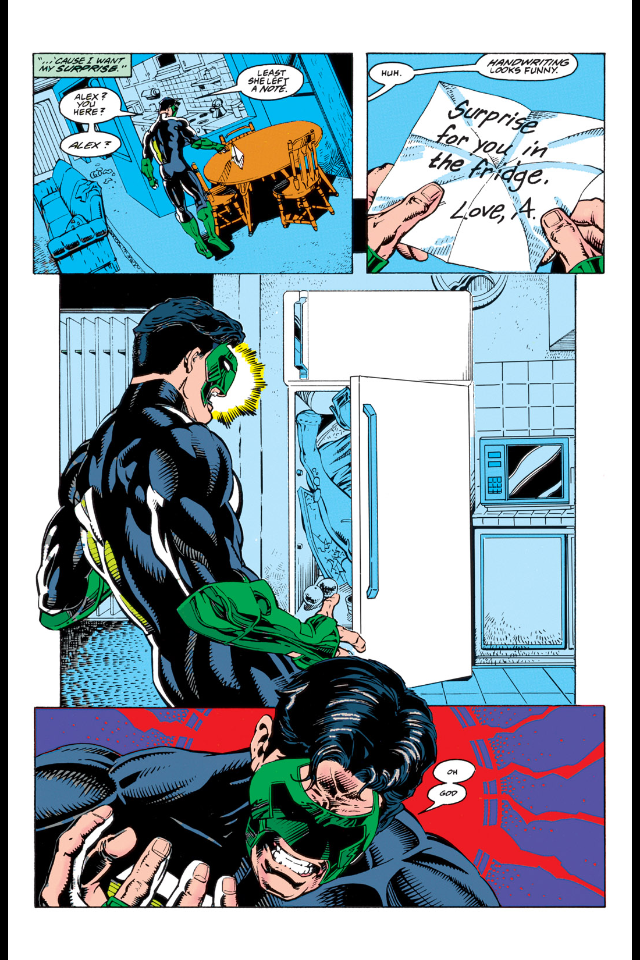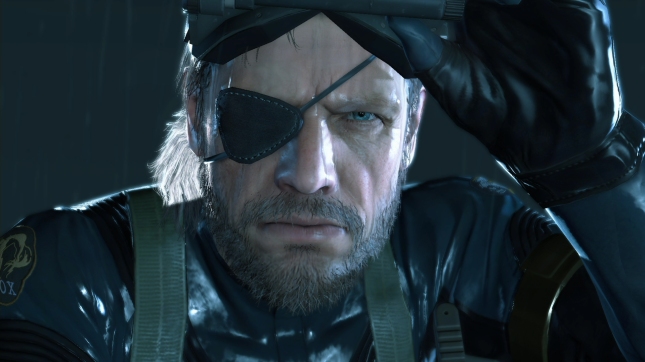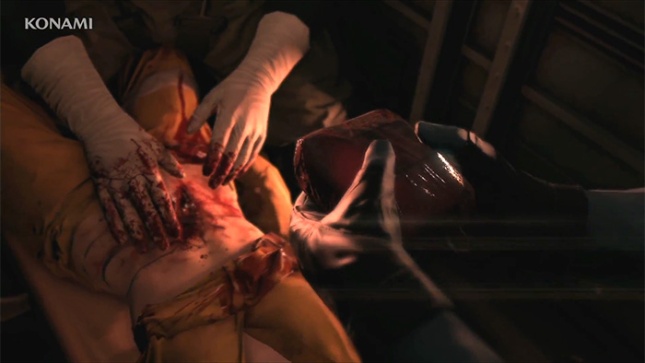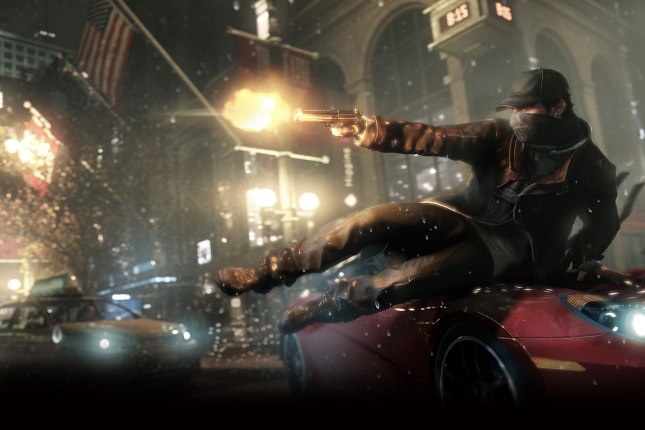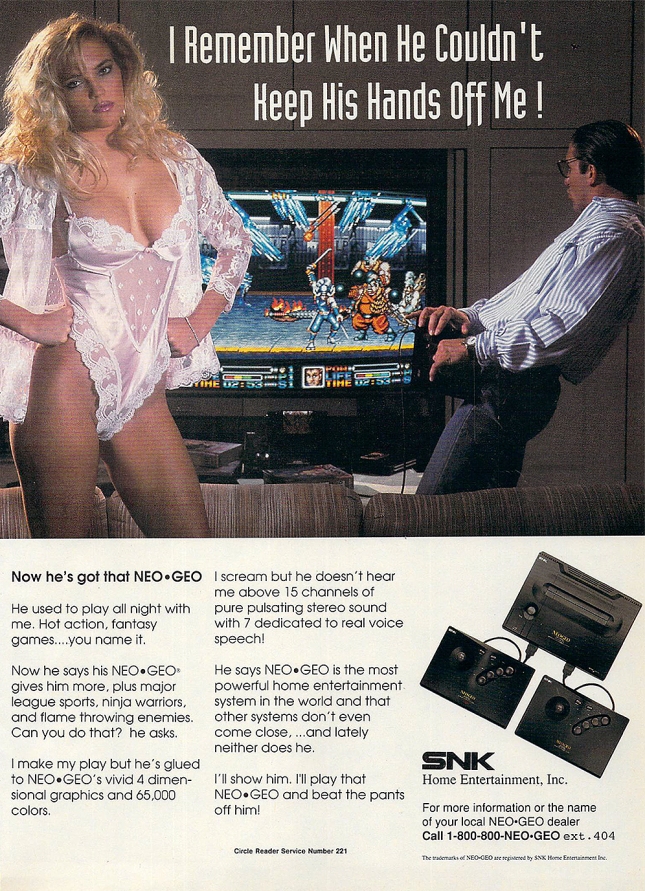I grew up reading Green Lantern. Much like Doctor Who, there have been multiple Green Lanterns in the lifetime of the comic, and you always have your favorite (The 10th and Hal Jordan.) Yet, Hal wasn’t my first. That honor goes to Kyle Rayner.
I could go into the backstory as to why Kyle got the ring, and who his predecessors were, and why Hal came back; but none of that really matters. All that you need to know going in was that when he took the mantle of GL, he was the only one and he loved it. Kyle was young, reckless, and took his role with little seriousness.
That was until this happened…
…yeah, that’s his girlfriend.
Long story short, she thought Kyle should take things more seriously; but he wasn’t the listening type. Unfortunately, one of his villains (aptly named Major Force) was, and decided to kill and stuff her into above fridge. The ensuing guilt propelled Kyle into being the hero that he was destined to be…
…and it also was the first instance of “fridge-ing”
Congrats, Geek Culture! We helped create a terrible narrative trope!
Unfortunately, things haven’t really gotten that much better as the years of have gone by. Female characters in comic books, games, and television have been mishandled, mischaracterized, and all together misused since then. For every Orange is the New Black, there are multiple shows, games, and comics that just do everything wrong.
Examples, you ask? Okay.
Game-wise, the two most recent offenders are Metal Gear Solid: Ground Zeroes and Watch_Dogs; which both use “fridge-ing,” as a narrative technique to motivate their respective heroes.
In MGS: Ground Zeroes, Big Boss/Snake is required to rescue former associates Paz (a female officer) and Chico (a young male soldier) from a government run facility. By the end of the game you have rescued them both, but it’s found out that Paz has had a bomb placed inside of her. So, in one of the most gruesome moments put to gaming, the male characters dig into her abdomen, un-anesthetized, and rip the bomb out.
It’s gross, over the top, and not the worst part.
After the bomb is removed and she comes to, she relates that she has a second bomb placed inside of her as well; and so she jumps out of the helicopter to save the rest, exploding mid-air. It is not revealed unless you go through some of the side content where the other bomb was hidden…
…her vagina.
Within the audio logs you find, you discover that Skullface (the villain) had not only his men rape Paz, but he had Chico rape her as well, and THEN placed the bomb into her. The audio logs are long, uncomfortable, and disgusting. There’s no narrative or gameplay value to their existence in the game outside of shock value and as a means to motivate the player character to revenge in the upcoming sequel.
Though not as graphic, Watch_Dogs is just as bad.
In the game, there are two main female characters, Clara (a hacker who befriends the player avatar) and Nicole (the player’s sister.) Suffice it to say, both ladies have little to no story arc simply because they exist only to continue to push the main character forward.
Nicole’s only contribution to the plot is to be captured, held hostage, and kidnapped multiple times over and over again to bring the player character to action. At multiple points in the game, the player has to hand hold her through an action filled situation, because she is unable to defend herself on ANY level.
Ironically, her subplot ends with her leaving her ENTIRE LIFE behind in Chicago, taking her son with her; as the player character realizes that her continued existence within the gamespace (Chicago) would only result in her getting kidnapped, killed, etc. over and over and over again.
(Did I mention that she had a daughter that the main character got killed because she was in a car with him when he was attacked by thugs? Yeah, that too)
Clara might be the bigger problem. She is introduced as a competent rival hacker, but soon afterward she just becomes an objectified character model walking around the hideout of the player. Unfortunately, this is not out of the ordinary for most video games. Because of her lack of development and any story arc to speak of, she becomes less a character and more a piece of set dressing.
(Oh yeah, there’s also the fact that her model is actually based off a well known porn actress too…which has very little to do with the argument above, but it sure doesn’t necessarily help matters either.)

The icing on this terrible cake is that she ends up being “fridged” as well by the end of the game. It is revealed that she had a hand in some of the events leading up to the game, which tangentially led to the death of the Aiden’s (the player’s character) niece. While visiting the grave of the girl, she is gunned down as the player is trying to rush forward to save her in real time gameplay.
This, of course, is followed up by the player having to listen to a 2 minute long voicemail she left, just before she died; apologizing for her involvement and wishing to “just disappear…”
…which in turn motivates Aiden into the final act of the game.
It’s all very frustrating, to say the least.
Yet, much like you see in other forms of media, there is a silver lining, a ray of hope that shows things are changing; if only ever so slowly.
Take a game like Transistor.

As fellow Promethean Stewart wrote,
“Transistor is a beautiful story about a woman whose voice (literally) was taken from her. It’s about her lover. It’s about a city that they both love deeply, but isn’t what it used to be. It’s about change, and remembering the way things were without ever being able to go back.”
Most importantly, it not only stars a female (Red) as a lead, but it gives her a complete, well written, and genuine story arc. She is not used, she is not thrown around by events in the game space, she is the one CREATING those events. In other words, she is a fully realized character.
Red has more of a voice without having one, has more of a message without saying a word, than any of the previously mentioned examples above….
…Cue Dramatic Irony
Joss Whedon, known for his work on Buffy, Angel, The Avengers, and much more said in an interview once,
“When people say to me, ‘Why are you so good at writing at women?’ I say, ‘Why isn’t everybody?’ Obviously there are differences between men and women – that’s what makes it all fun. But we’re all people.”
It’s a pretty straightforward sentiment, but one that geek culture is now just starting to embrace, albeit slowly. Hopefully as we all continue to move forward, and as the medium continues to mature, we’ll see more games like Transistor, Gone Home, or Mirror’s Edge.
Geek culture has to come to terms with the fact that sexism and misogyny are deeply ingrained, and figure out what we can do to excise that cancer from our favorite hobbies. I’d like to believe that we are all better than this…

